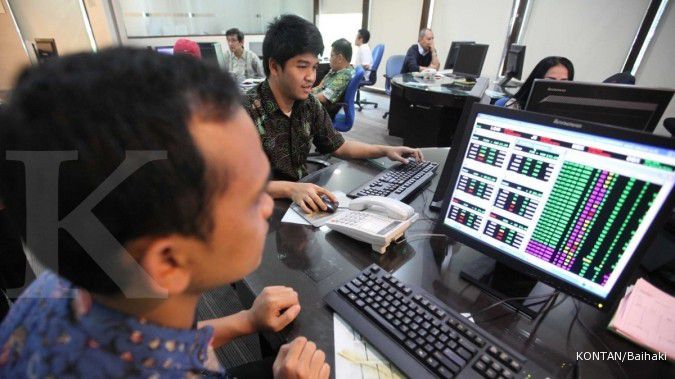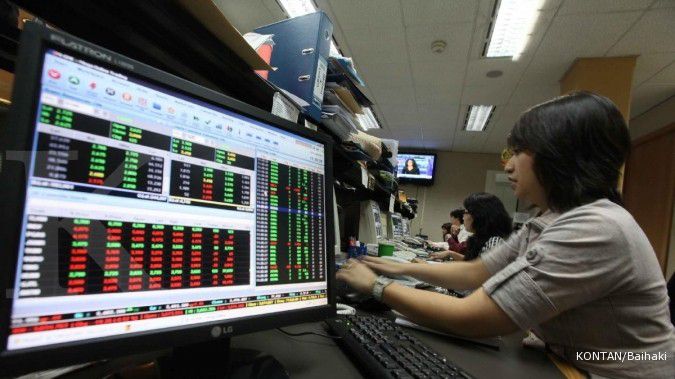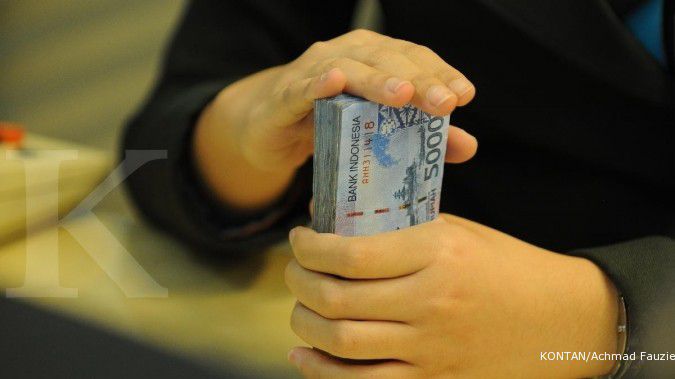JAKARTA. Less than three weeks before the inauguration of president-elect Joko “Jokowi” Widodo, share prices and the rupiah both extended their losses on Friday.
The sell-off occurred amid growing friction between parties supporting Jokowi and a coalition of parties led by losing presidential contender Prabowo Subianto.
The Jakarta Composite Index (JCI), the benchmark price index in the Indonesian stock market, dropped by a further 1 percent on Friday to close at 4,949.36, the lowest level in three months, having lost nearly 3 percent the previous day.
The rupiah fell 0.2 percent on the day and 1.3 percent this week to 12,177 per dollar, capping a seventh weekly drop, data from Bloomberg showed. Government bonds fell for a fourth consecutive week, with the yield on the notes due March 2024 jumping 25 basis points to 8.49 percent, according to the Inter-Dealer Market Association.
Concern over political tension was expressed not only by financial observers but also by Coordinating Economic Minister Chairul Tanjung, who said that share prices and the rupiah would continue to fall if no political breakthrough were made.
“[If the friction continues], not only will both the composite index and the rupiah drop, the country’s economy will stumble,” Chairul said on Friday.
He added that he hoped that the parties supporting the president-elect would accept being in the minority so that the next government could rule effectively. “I know that it’s hard to accept [...] This country, however, cannot be built by one group, but by all groups without exception,” he told The Jakarta Post.
The opposition coalition group, which controls more than half the seats in the House of Representatives, has aroused ire by passing a law scrapping direct local elections and electing the speaker and four speaker deputies of the House from their own ranks.
There is growing concern that with the opposition’s ever-firmer grip on the House, Jokowi will be unable to secure enough support to implement his economic program, anticipation of which had contributed to this year’s 17 percent increase in share prices.
Financial analysts believe that the growing political uncertainty could cause share prices and the rupiah to continue to fall even after the president-elect takes office on Oct. 20.
First Asia Capital’s David Sutyanto said that for the rest of the year, foreign investors were likely to continue withdrawing investment from the bourse.
“There might be a brief upturn in the market when Jokowi announces his ministries. Other factors that might affect the JCI for the remainder of the year are updates from the US Federal Reserve and the president-elect’s plan to raise fuel prices in November, both of which might drag down the index,” David said.
Willy Sanjaya from Lautan Dana Investama was of the opinion that the index would continue to struggle unless Jokowi stood up to his adversaries.
Most other indices fell on the week, with Thai stocks sliding 1.9 percent after two straight weeks of gains and the Singapore index dropping 1.2 percent on the week, its third straight week of losses, while the Philippines index extended its losses for a second week, down 0.2 percent.
Also expressing his anxiety was Indonesian Chamber of Commerce and Industry (Kadin) chairman Suryo Bambang Sulisto, who said that the clash between the two opposing political groups would deepen uncertainty in the country. (Khoirul Amin and Anggi M. Lubis)
/2014/09/29/302136988.jpg)












